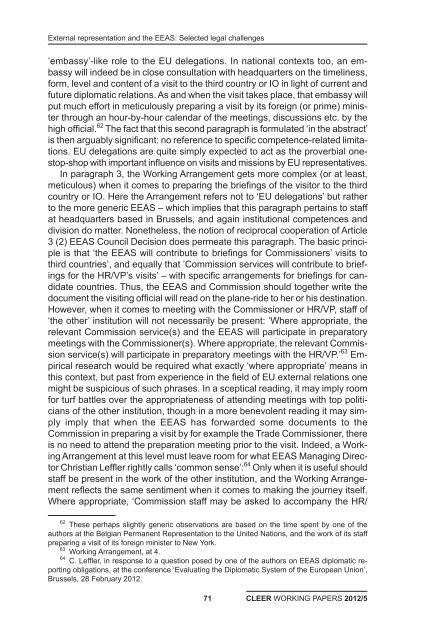Principles and practices of EU external representation - TMC Asser ...
Principles and practices of EU external representation - TMC Asser ...
Principles and practices of EU external representation - TMC Asser ...
You also want an ePaper? Increase the reach of your titles
YUMPU automatically turns print PDFs into web optimized ePapers that Google loves.
External <strong>representation</strong> <strong>and</strong> the EEAS: Selected legal challenges<br />
’embassy’-like role to the <strong>EU</strong> delegations. In national contexts too, an embassy<br />
will indeed be in close consultation with headquarters on the timeliness,<br />
form, level <strong>and</strong> content <strong>of</strong> a visit to the third country or IO in light <strong>of</strong> current <strong>and</strong><br />
future diplomatic relations. As <strong>and</strong> when the visit takes place, that embassy will<br />
put much effort in meticulously preparing a visit by its foreign (or prime) minister<br />
through an hour-by-hour calendar <strong>of</strong> the meetings, discussions etc. by the<br />
high <strong>of</strong>ficial. 62 The fact that this second paragraph is formulated ‘in the abstract’<br />
is then arguably significant: no reference to specific competence-related limitations.<br />
<strong>EU</strong> delegations are quite simply expected to act as the proverbial onestop-shop<br />
with important influence on visits <strong>and</strong> missions by <strong>EU</strong> representatives.<br />
In paragraph 3, the Working Arrangement gets more complex (or at least,<br />
meticulous) when it comes to preparing the briefings <strong>of</strong> the visitor to the third<br />
country or IO. Here the Arrangement refers not to ‘<strong>EU</strong> delegations’ but rather<br />
to the more generic EEAS – which implies that this paragraph pertains to staff<br />
at headquarters based in Brussels, <strong>and</strong> again institutional competences <strong>and</strong><br />
division do matter. Nonetheless, the notion <strong>of</strong> reciprocal cooperation <strong>of</strong> Article<br />
3 (2) EEAS Council Decision does permeate this paragraph. The basic principle<br />
is that ‘the EEAS will contribute to briefings for Commissioners’ visits to<br />
third countries’, <strong>and</strong> equally that ’Commission services will contribute to briefings<br />
for the HR/VP’s visits’ – with specific arrangements for briefings for c<strong>and</strong>idate<br />
countries. Thus, the EEAS <strong>and</strong> Commission should together write the<br />
document the visiting <strong>of</strong>ficial will read on the plane-ride to her or his destination.<br />
However, when it comes to meeting with the Commissioner or HR/VP, staff <strong>of</strong><br />
‘the other’ institution will not necessarily be present: ‘Where appropriate, the<br />
relevant Commission service(s) <strong>and</strong> the EEAS will participate in preparatory<br />
meetings with the Commissioner(s). Where appropriate, the relevant Commission<br />
service(s) will participate in preparatory meetings with the HR/VP.’ 63 Empirical<br />
research would be required what exactly ‘where appropriate’ means in<br />
this context, but past from experience in the field <strong>of</strong> <strong>EU</strong> <strong>external</strong> relations one<br />
might be suspicious <strong>of</strong> such phrases. In a sceptical reading, it may imply room<br />
for turf battles over the appropriateness <strong>of</strong> attending meetings with top politicians<br />
<strong>of</strong> the other institution, though in a more benevolent reading it may simply<br />
imply that when the EEAS has forwarded some documents to the<br />
Commission in preparing a visit by for example the Trade Commissioner, there<br />
is no need to attend the preparation meeting prior to the visit. Indeed, a Working<br />
Arrangement at this level must leave room for what EEAS Managing Director<br />
Christian Leffler rightly calls ‘common sense’: 64 Only when it is useful should<br />
staff be present in the work <strong>of</strong> the other institution, <strong>and</strong> the Working Arrangement<br />
reflects the same sentiment when it comes to making the journey itself.<br />
Where appropriate, ‘Commission staff may be asked to accompany the HR/<br />
62 These perhaps slightly generic observations are based on the time spent by one <strong>of</strong> the<br />
authors at the Belgian Permanent Representation to the United Nations, <strong>and</strong> the work <strong>of</strong> its staff<br />
preparing a visit <strong>of</strong> its foreign minister to New York.<br />
63 Working Arrangement, at 4.<br />
64 C. Leffler, in response to a question posed by one <strong>of</strong> the authors on EEAS diplomatic reporting<br />
obligations, at the conference ‘Evaluating the Diplomatic System <strong>of</strong> the European Union’,<br />
Brussels, 28 February 2012.<br />
71<br />
CLEER WORKING PAPERS 2012/5

















